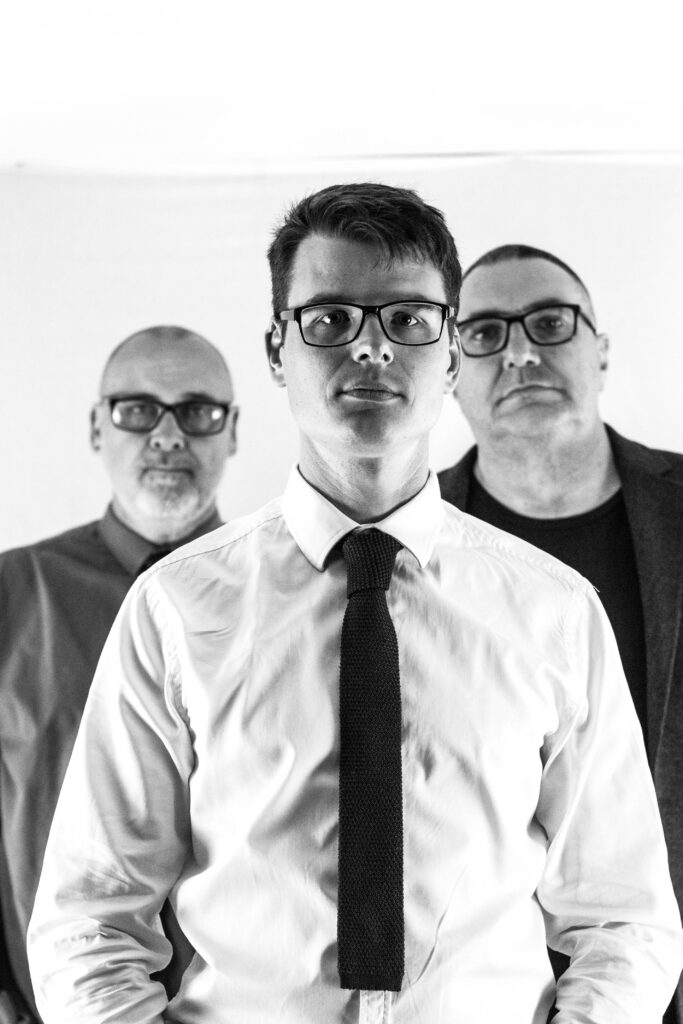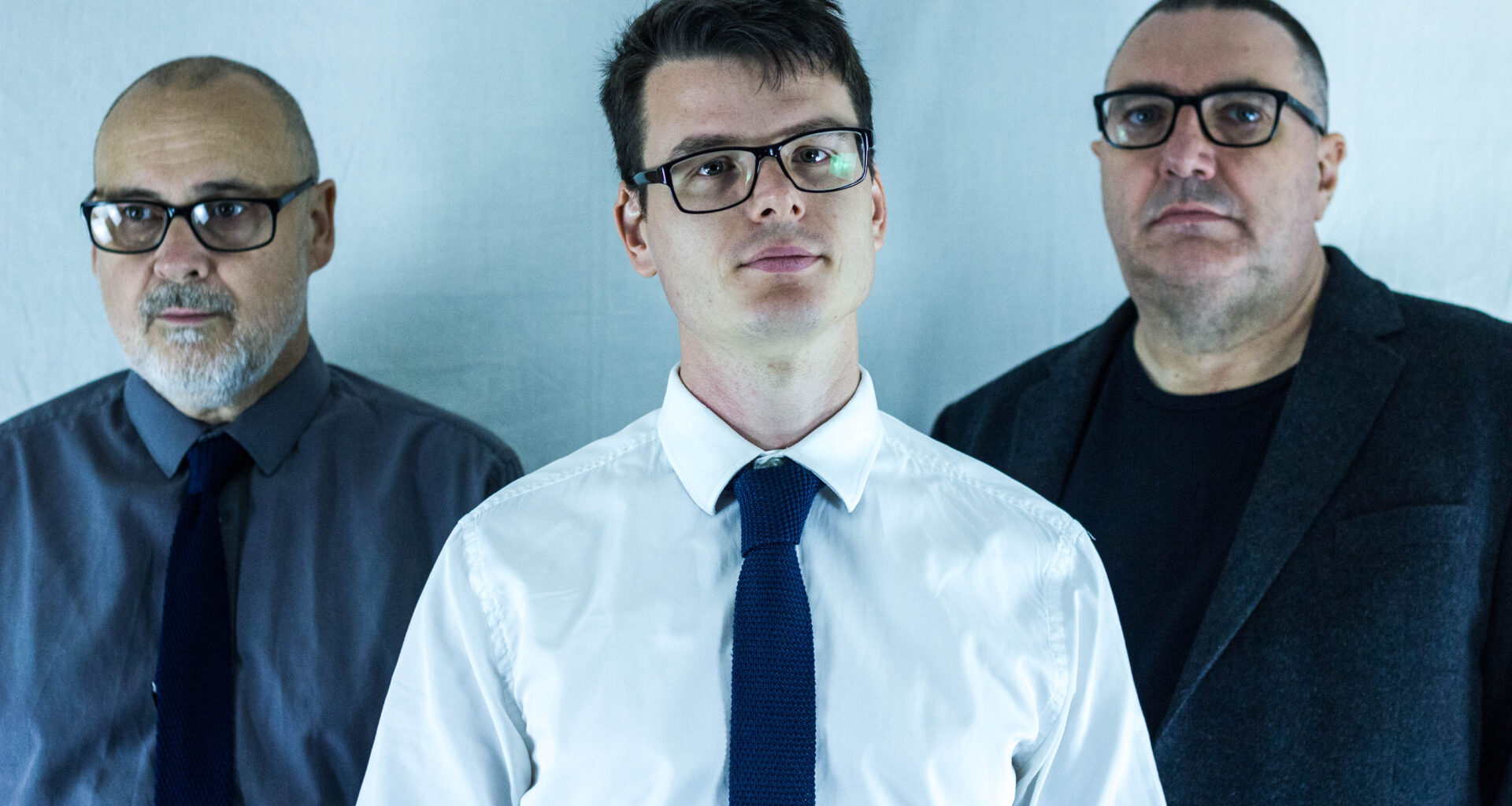Despite the acclaim and avid fanbase, Marconi Union are strong silent types with a deathly serious outlook and a reluctance to engage about their expansive ambient soundscapes, right? As their 10th long-player drops, they blow that idea clean out of the water
“Do we look elusive to you?” chuckles Marconi Union co-founder Richard Talbot, who is relaxed into a comfortable-looking sofa next to band mate Duncan Meadows.
“It’s partially true”, says Meadows.
“It used to be very true!” adds Talbot.
If you believe everything you read on the internet, you’d expect Marconi Union to be rather recalcitrant fellows. Wikipedia claims the group has “a reputation for being somewhat elusive, as they frequently refuse interview requests”. Yet, here we are, speaking to Talbot and Meadows from the latter’s home in Manchester. Going on first impressions, they appear to be very affable indeed.
So what has changed, then? While third member Jamie Crossley is absent from today’s conversation (“If anyone can convince Jamie to give an interview, then they’re doing well,” laughs Meadows), Marconi Union clearly haven’t run out of things to say. Over the years they have produced an expansive body of work, with nine studio albums that have shape-shifted across electronica, minimalism, jazz, ambient and dub. Their practice is deeply explorative, but never dull.
“We are interested in talking to people who are interested in music,” offers Talbot.
Following on from 2016’s energetic-by-their-standards ‘Ghost Stations’, Marconi Union are poised to release album number 10, ‘Dead Air’. Even when judged against the trio’s critically acclaimed back catalogue, ‘Dead Air’ is a particularly arresting, a confident stride forward. In keeping with the trio’s always-fluid writing process, the record went through a number of permutations.
Late in the piece, a decision was made to strip the drums off of the tracks. The result is a triumphant and slowly evolving ambient masterpiece that beguiles the listener with each gentle variation of mood and texture. The album title is a sly injection of Marconi Union’s northern humour. Then there’s the title of the opening track ‘AMID’ – short for “Ambient Music Is Dead” – which is certainly a conversation starter.
“There’s something provocative about saying that”, agrees Talbot. “It’s an interesting question. I suppose for us, the question is, ‘What does ambient music mean in 2019?’. It’s kind of a long way from, say, Eno’s definition in 1978. Now you can wander around and hear rock bands being played as background music. I’m not sure what that means for the idea of background music. What is background music anymore? We are regularly described as being an ambient band and that’s something we’re also not sure about. Ambient music means so many things to so many different people. We can’t really describe it, but we probably know what it is when we hear it… so we just wanted to put that question out there.”
It’s unsurprising that a musician of Talbot’s experience would cite Brian Eno as a litmus test of ambient composition. The touchstone is apt for Marconi Union given their intersections with Eno throughout their career. After their self-produced debut album, ‘Under Wires And Searchlights’, came out in 2003, they were picked up by All Saints Records, a label closely associated with Eno, for their second record ‘Distance’. And in 2012, the group played Norway’s Punkt Festival at the invitation of Eno, who curated the event.
“We didn’t have a hugely meaningful conversation, but we did get to meet him and have a chat,” says Talbot.
“He was wearing an incredible suit!” adds Meadows. “He has excellent dress sense.”
Another high-profile affiliation occurred in 2015 when the band worked with the celebrated Serbian-American performance artist Marina Abramovic. Their contribution, a sound/visual art installation piece entitled ‘Weightless/Endless’, was developed in conjunction with the Marina Abramovic Institute. So did they meet Abramovic personally?
“We didn’t actually meet Marina,” laughs Talbot. “But Duncan was sitting next to her and didn’t realise!”
“It was in The Serpentine Gallery,” explains Meadows. “She was focussing on mindfulness in the performance, so in one of the rooms they’re picking lint off the carpet, and in another room there was a bunch of chairs. You go in, you sit, and there’s just silence… and then as I came out, Richard said to me, ‘You were just sat right next to her’. But obviously when you’re in there, you’re not just sat gazing around, you know.”
Collaborative work plays a big part in Marconi Union’s creative process. Guest musicians are frequently invited into the fold and over the years they have worked with a wide range of artists from Jah Wobble to Italian trumpeter Giorgio Li Calzi. Given that the genre they work in is traditionally a solitary pursuit, it’s an interesting take for a group who make predominantly ambient music. How does creating these kind of compositions work as a trio?
“It’s interesting that you use the word solitary,” muses Meadows.
“For me, it goes back to when I joined the band, shortly after my first daughter was born. I was trying to find a way that I could still write and record. I had a very simple set-up in the bedroom – just headphones, one keyboard, recording straight into software. Having the limitation of one keyboard is quite liberating because it focuses your mind. You get your head into that one keyboard instead of jumping in and out of things. I found it quite creatively rich. I got a lot out of that process.
“At that point I was completely solitary, cut off from the world, but then it really became interesting once other people take that music and add their own thing and take it somewhere else. I think that’s why being in this band is always interesting; because of that dynamic.”
It’s a dynamic that’s served them well. Marconi Union formed in 2002 when Talbot and Jamie Crossley met while working in a record store in Manchester. At the time Talbot was making “very ambient, drone-based stuff”, which he would share with Crossley, who would take the recordings home and layer other instruments over the top. Meadows, who has a classical/jazz background, joined later, around the time of 2012’s ‘Different Colours’. Younger than Talbot and Crossley by some years, there’s an endearing relationship between the trio.
“I’m still making the tea,” jokes Meadows. “But joining a band where they are already three or four albums deep is quite terrifying.”
“It was for us as well, though,” chimes in Talbot.
“Jamie can play a lot of different instruments – even though he says he can’t,” continues Meadows, “and Richard also plays a lot of different instruments, so it was like, ‘Where do I fit into this?’. There’s a sweet spot for me where, for how our music works, you can’t ever sound too musical, but at the same time we’re not about writing structured, popular music. It took me ages to work out what I was doing. To be honest, piano is my main instrument and I’m still working out how piano fits into some of our music.”
‘Dead Air’ is marked by the choral beauty of ‘Permafrost’ with heavily processed voice samples bringing the group the closest they’ve come to including vocals on an album. It’s Meadows’ voice that features on the record, with Crossley adding “a line here and there”.
“We’re an instrumental band, so there’s no lyrical content,” says Meadows. “In a lot of music it’s the lyrics that carry the meaning, isn’t it?
It’s the lyrics that give it focus. There are snatches of vocals on the album,
but they’re presented more as textures. I’m not really singing, so once you add some reverb and delay it masks the technical deficiencies. We’re not about technique, it’s more about, ‘Is this sound right for the track?’.”
This last statement prompts a chortle from Talbot.
“We’re not about that technique! That’s a good quote,” he laughs.

‘Dead Air’ implies a kind of environmental ambiguity, underscored by the album’s track titles. Alongside ‘Permafrost’ the celestial ‘Mossfield’ utilises Meadows’ manipulated vocals to conjure a fertile sonic landscape. ‘Burned’ evokes a sense of regeneration, while ‘Fractured’ vibrates with a delicate yet harsh energy.
Meadows says that at one point the trio toyed with the idea of not having song titles, or using nonsense titles “because I think we were conscious about not having preconceptions about the music. But we rejected it in the end, because that’s sort of been done before, hasn’t it? And it’s hard enough to remember the tracks as it is without having to refer to them as just numbers.”
“The pieces have had different titles at different times,” says Talbot, while explaining that some of the tracks have been around since as far back as 2015. “I hate the word ‘organic’, but there is something quite natural about it. An evolution, perhaps. I guess because we don’t have lyrics, the interpretation of the music is much more flexible. Maybe we should stop doing titles that are so literal.”
“But, if you look through a whole rack of ambient records, so many of them will have song titles that are about landscapes. There’s an interesting thing that Eno said about landscapes. If you look at a picture of a landscape, if there’s a human figure in it, no matter how small, your eye is automatically drawn to that human figure.”
In 2011, Marconi Union created an eight-minute track ‘Weightless’ in collaboration with the British Academy of Sound Therapy. Comprised of piano, guitar, and electronic samples of nature recordings it has since been hailed as the “World’s most relaxing song”. Later that year, the group were featured in Time magazine’s list of Inventors Of The Year for their work on the piece. Surely a surreal accolade for them?
“My mum was very pleased,” quips Talbot.
Despite the praise, and the awards and honours that they have garnered, there’s no shaking the humble, modest foundations that Marconi Union’s attitude is built upon. This is a group who have long attracted critical acclaim and built a loyal fanbase, but mainstream recognition has remained elusive. Surely that’s something they’re entitled to feel a little bit disgruntled about?
“I think musicians are terrible for that, they all think they should be far more important than they are”, says Talbot. “It’s like Spinal Tap. I don’t think we’re ever wandering around thinking, ‘Well, why aren’t we getting Grammys?’.
You have to be realistic about the appeal of what you do. We’re never going
to have mass appeal.”
“It would be disingenuous to say that we don’t want to sell records,” adds Meadows. “But it doesn’t inform, and never has, what we’re making.”
“It’s not something we sit around worrying about,” says Talbot, matter-of-factly. “We just keep doing what we are doing. We’ve been at it a long time. We could have done more obvious records, or more obvious remixes… we’ve had the potential at times to do these things and we’ve not taken them, for one reason or another, so it’s our own fault we’re obscure.”
Turn the radio up, folks. New material is here, the airwaves are clear, and Marconi Union are ready for transmission.
‘Dead Air’ is out on Just Music






